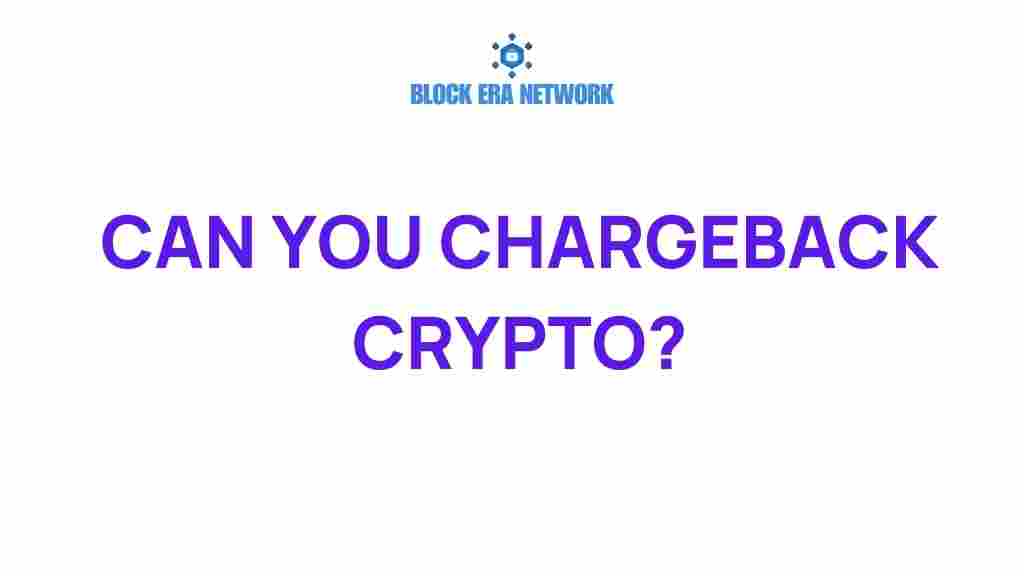Can You Chargeback Crypto? Unraveling the Myths and Realities
The rise of cryptocurrency has introduced a new era of digital transactions, offering unparalleled benefits like transparency, speed, and security. However, as with any financial innovation, it also brings questions—especially regarding consumer rights and the process of chargebacks. If you’re wondering whether you can chargeback crypto, you’re not alone. This article will unravel the myths and realities surrounding chargebacks in the cryptocurrency space, focusing on refunds, scams, and financial security.
Understanding Chargebacks in Traditional Transactions
To understand chargebacks in the context of cryptocurrency, we must first explore how they work in traditional financial transactions. A chargeback is essentially a reversal of a transaction, initiated by the consumer through their bank or credit card issuer. This process allows consumers to dispute a charge and receive a refund under specific circumstances, such as:
- Fraudulent transactions
- Unauthorized purchases
- Goods or services not received
- Billing errors
In traditional finance, chargebacks are a consumer’s right, rooted in regulations like the Fair Credit Billing Act in the United States. These protections are crucial for maintaining trust in digital payment systems.
The Nature of Cryptocurrency Transactions
Cryptocurrency operates on a decentralized, blockchain-based system. This means that once a transaction is confirmed, it is recorded immutably on the blockchain. Unlike traditional banking systems, there are no intermediaries involved in cryptocurrency transactions, which complicates the concept of a chargeback.
Why Chargebacks Are Not Applicable to Cryptocurrency
Here are several reasons why chargebacks are generally not an option when it comes to cryptocurrency:
- Irreversible Transactions: Once a crypto transaction is confirmed, it cannot be reversed. This is one of the fundamental characteristics of blockchain technology.
- Lack of Regulation: Cryptocurrencies operate in a largely unregulated environment, meaning consumer protection laws that apply to traditional transactions do not extend to crypto transactions.
- Anonymity and Decentralization: The decentralized nature of cryptocurrencies means there’s often no identifiable party to hold accountable for issues, making chargebacks impractical.
Consumer Rights in Cryptocurrency Transactions
While chargebacks are not applicable, consumers still have rights when engaging in cryptocurrency transactions. Understanding these rights is essential for protecting yourself from scams and fraudulent activities:
- Due Diligence: Consumers should always conduct thorough research before engaging with a platform or making a purchase with cryptocurrency.
- Secure Transactions: Utilize wallets and exchanges with robust security measures to protect your assets.
- Transparency: Ensure that the service provider is transparent about their terms and conditions.
Refunds in the Cryptocurrency World
Although chargebacks are not possible, refunds can still be issued in certain circumstances. Here’s how refunds typically work in the crypto space:
- Merchant Policies: Some merchants may have their own refund policies. If you believe you are entitled to a refund, you should directly contact the merchant to discuss your situation.
- Smart Contracts: Certain cryptocurrencies and platforms utilize smart contracts, which can automate the refund process under specified conditions.
- Dispute Resolution Services: Some platforms offer dispute resolution services that can help mediate between consumers and merchants.
Scams and Fraud in the Cryptocurrency Space
The cryptocurrency landscape is rife with scams and fraudulent schemes, making it crucial for consumers to be vigilant. Here are common types of scams to be aware of:
- Phishing Scams: Fraudsters may create fake websites or emails to lure consumers into providing their private keys or personal information.
- Pump and Dump Schemes: Scammers artificially inflate the price of a cryptocurrency before selling off their holdings and leaving unsuspecting investors with losses.
- Investment Scams: Promises of guaranteed returns often signal a scam. Always be cautious of promises that seem too good to be true.
How to Protect Yourself When Using Cryptocurrency
To ensure financial security while dealing with cryptocurrencies, consider the following tips:
- Use Reputable Exchanges: Choose well-known and trusted exchanges for your transactions.
- Enable Two-Factor Authentication: This adds an extra layer of security to your accounts.
- Keep Personal Information Private: Be cautious of sharing personal information online.
- Educate Yourself: Stay informed about the latest scams and security practices in the cryptocurrency space.
Step-by-Step Process for Handling Issues in Crypto Transactions
If you encounter an issue with a cryptocurrency transaction, follow this step-by-step process:
- Identify the Problem: Determine whether the issue is with the merchant, the platform, or the transaction itself.
- Contact the Merchant: If applicable, reach out to the merchant to inquire about refunds or dispute options.
- Check Exchange Policies: Review the policies of the exchange or wallet provider you used for any potential recourse.
- Utilize Dispute Resolution Services: If your transaction was through a platform that offers dispute resolution, take advantage of this service.
- Report the Scam: If you believe you’ve fallen victim to a scam, report it to the relevant authorities and consider alerting your cryptocurrency community.
Troubleshooting Tips for Common Cryptocurrency Issues
Here are some troubleshooting tips for common issues you may face:
- Transaction Stuck: If your transaction is stuck, check the network congestion and consider increasing the transaction fee.
- Lost Wallet Access: Ensure you have your recovery phrase backed up. If you lose access, your funds may be unrecoverable.
- Suspicious Activity: If you notice any unauthorized transactions, immediately secure your account and contact your exchange.
Conclusion: Navigating the World of Cryptocurrency Transactions
In conclusion, while you cannot chargeback cryptocurrency transactions like traditional financial transactions, there are still ways to seek refunds or resolve disputes. Understanding the unique characteristics of digital transactions, staying informed about scams, and knowing your consumer rights are essential for navigating the world of cryptocurrency safely. Always prioritize financial security and approach crypto payments with caution.
For more information on consumer rights and protections in the cryptocurrency space, check out this Consumer Financial Protection Bureau article. If you would like to learn more about specific cryptocurrency exchanges and platforms, visit our resource page.
This article is in the category Crypto Security and created by Block Era Network Team
